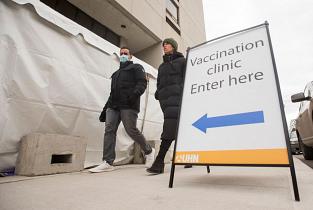Wondering When The Pandemic Will End? Here’s The Expected Timeline For Canadians.
“Once the pandemic is over.”
That’s the caveat when making plans with friends, family and pretty much anyone else these days. We have two vaccines approved in Canada, and worldwide there are dozens of others in various trial stages.
But it might be a while before everyone in the country is vaccinated. And, in the meantime, cases are spiking and hospitals in some provinces are dealing with worrying capacity issues.
Where we go from here is complicated, experts say. There are still questions about how many people will take the vaccine, and how effective it will be at stopping the spread of the virus. All those future plans we want to make — from dinner parties with extended family to karaoke with friends — depend on these factors, though experts say it likely won’t be until the end of 2021 when life will feel more normal.
‘Back to normal’ may depend on health-care system capacity
For a disease to be eradicated, you need two things: a treatment and a vaccine that leads to herd immunity, Cynthia Carr, an epidemiologist based in Winnipeg, told HuffPost Canada.
Herd immunity occurs when enough people contract an illness or are vaccinated against it and become immune so it can no longer spread.
Carr does not believe in illness as part of a herd immunity strategy, so she said it’s important to continue with public health measures as vaccinations continue.
Based on those two criteria to eradicate a disease, Carr said it’s “highly unlikely” COVID-19 will completely go away — it will likely continue to circulate, possibly seasonally, like other viruses.
“So I think in terms of quote ‘back to normal,’ it’s going to depend on how well these vaccines assist the health-care system,” she said.
If a vaccine can alleviate some of the immediate impact on the system, it could be safer to gather in larger groups — but that likely wouldn’t be until “well into” 2021, Carr warned.
It may fall to local areas to make decisions about reopening as community-based spread and the rates of serious health impacts decrease, she said.
Carr also cautioned that the COVID-19 vaccine may not prevent the longer-term health outcomes that some people, sometimes called “long haulers,” have experienced.
“That will again inform how much risk we can really afford to take,” she said.
Eventual reopenings will likewise depend on how many people take the vaccine, said Dr. Susy Hota, the medical director of infection prevention and control at University Health Network in Toronto.
A December Angus Reid poll indicated 48 per cent of Canadians want to be vaccinated as soon as possible, up from 40 per cent a month ago.




